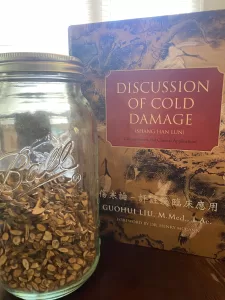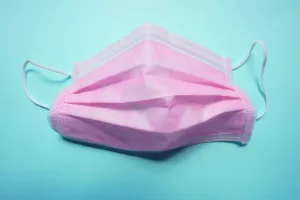Allergies
Spring Wind!

Did anyone else notice how many times in the past week the weather said something like 52 but felt more like 32? Spring wind! In the lunar calendar we are already well into spring, the season the ancient Chinese correlated with pathologies of “wind.” What does that mean?
“Wind pathologies,” in Classical Chinese, basically refers to anything that moves within the body. Think joint pains or almost any pains, also neurological tics, from Restless Leg to Parkinson’s disease, finally many dermatological conditions that traverse different body parts and seem to constantly change in shape or surface area covered. Where does it come from?
The pathology of autumn is dryness, hence all the foliage drying up and sinus issues it commonly brings. Following is the bitter cold of winter, which consolidates said climate of dryness, constricts our blood vessels, thereby offering fewer pathways for lubrication, whether to our skin, orifices, or otherwise.
Dryness, in Chinese medicine, whether manifesting as a lack of blood, lack of healthy blood, mucosal metabolic fluids, or parasympathetic neurotransmitters, can give rise to physiological symptoms that might be metaphorically described as “wind.”
Another cause can be literal wind, as it gusts down the avenues and seemingly even turns corners to blow hats off our heads and make 52 degrees feel like 32. This causes a local constrictive response in the head, which contains our autonomic nervous system, which manages a great part of vital organ function. Am I suggesting the entire body is connected and that which accosts the head can in turn accost our entire physiology? Yes. Ask anyone who’s suffered a concussion. What can we do?
Wear a scarf. Wear a hat or a hood. Wear a hood over your hat. Wear a mask beneath the hat beneath the hood above your scarf. You don’t have to be sick or paranoid to wear a mask in the cold and/or windy months of the northeast. You can simply be protecting your many cranial nerves that traverse the face and have far-reaching physiological implications. Modern fashion is such that there are many stylish options for these accessories. With all we have already working against us—modern stress, western diet, the simple biology of aging—doesn’t it make sense to do the simple, little things to prevent or prolong the scale from tipping into Parkinson’s?
As for “wind prevention” by way of treating the root, which is to say nourishing blood and vital fluids, I have mostly the same old boring, science-based advice: Animal protein, eggs, cooked vegetables, small portions of rice or pasta, meditation, and going to sleep before 11pm. As for accessible, food-grade Chinese medicine, tea made from red dates, licorice, and/or pearl barley can also be helpful. For the spring we also recommend more sour foods, kraut, lemon, and/or vinegar with the intention of “astringing” as many of our good fluids as possible.
Lastly, happy Mercury Retrograde, an admittedly somewhat ironic salutation to those who “observe.” Remember to expect delays in transit and traffic and problems in technology and communication. Double check who you’re sending that text or email to. Accept that things will go wrong. Try to breathe. Ask people to clarify before shouting back at them. Breathe again.
(photo from a fun shoot back in 2007, one year pre-Chinese medical school!)
Acupuncture as a Treatment for Allergies

Allergies affect millions of people worldwide, causing symptoms ranging from mild discomfort to life-threatening reactions. Conventional treatments typically involve antihistamines, corticosteroids, or immunotherapy, but these approaches often address only the symptoms rather than the root cause. As people seek more holistic and natural treatments, acupuncture has emerged as a popular alternative therapy for managing allergies. continue reading
Treatment for Loss of Voice

As we approach an exciting Yankees first World Series appearance in 15 years, Halloween, and an even scarier Election Day, there’s a good chance a lot of people will be losing their voices, as a result of screaming and shouting, hopefully for joy. Couple that with the dry autumn season, which corresponds with Chinese medicine’s lung channel, and many will be more prone to hoarseness and/or dry, hacking coughs.
Aphonia, or loss of voice, can happen for one of two reasons in Chinese medicine:
- The adrenals that secrete hormones, such as estrogen are weak and/or weak in reserves and there just isn’t enough fluid to lubricate the throat. For this, the best self-care recommendations are eating good quality pork and beefs and getting plenty of rest, with early bedtimes. Herbal medicine is preferable to acupuncture, namely formulas that help strengthen the kidneys and generate systemic fluids.
- Dryness exists more around the pancreas and stomach organs, subtly impairing digestion and giving rise to dry, inflammatory heat that tends to flare up into the chest and throat, then drying out the fluids up top and creating a vicious cycle. Labeled a “Shao Yang” pathology, this is common in singers and teachers, and can be treated with acupuncture and/or herbal medicine. Best self-care recommendations are possibly a bit more exercise, white rice, and/or congee and sweet potatoes, red date tea, and again, early bedtimes.
Of course, there are other causes, other etiologies and contributing factors, such as being on one’s menses, which dries out the internal blood, which in turn dries out either the kidneys or digestive organs, exemplifying these patterns as primary suspects to target in treatment.
Peppermint tea with honey is another fine option to treat, although if you are prone to bloating, loose stool, or lack of appetite, honey might not be the best thing for you.
On the other hand, ginger tea is likely to aggravate this situation due to its drying nature. While potentially very healthy, ginger has earned itself an undeserving reputation as unconditionally so, especially when treating people suffering from anemia or any chronic dryness.
When navigating any form of soreness or dryness from the chest up it is advisable to avoid hot sauce or spicy foods, as they can obviously aggravate the inflammation. Ironically, it is equally advisable to avoid iced cold drinks, which constrict vasculature around the throat and further impede the arrival of healthy systemic fluids to lubricate the region
Wishing everyone a lubricated throat and organs in these highly anticipated events!
I’m predicting Yankees in 7.
I’m predicting Kamala.
And in a group family effort, I will be Olaf from Frozen for Halloween. Pics to come!
Allergies and Chinese Medicine

Allergy season is here! Claritin and Allegra are flying off the shelves as people fly out of their minds, unable to stop mucus from plummeting from their orifices. Eyes are itchy, sneezing on trains is incessant, peaking everyone’s concern about the guy next to them. Is it Covid or allergies? Probably the latter, but not worth the risk. As the new fight or flight of cold and flu season goes: Mask or move?
In Chinese medicine allergies are a symptom of “wei qi deficiency,” or immunological compromise, in the springtime generally due more to a weakness in the body’s blood or healthy organ fluids—in fall more to excess inflammation and/or a weakened microbiome.
Fall is the season that corresponds more with the lungs and respiratory orifices, making allergies at this time of year a bit more biologically “normal” than those in the spring. Spring corresponds with the “liver,” which is to say the functional aspect of the body that uses blood to raise cellular energy upwards and outwards, including our immunological cells. Chances are good if one suffers with spring allergies, they might also be prone to anemia, dizziness, general dryness, or blood loss (which includes childbirth!).
While OTC medications are reductionist medicine—never the most thoughtful treatment—they are understandable to use as needed, temporarily and in moderation. Over time they can indiscriminately dry out our healthy fluids, especially in allergy sufferers of the spring variety. Persons with severe blood or fluid deficiency often find that OTC allergy meds are either ineffective or only temporarily effective, causing they or their doctor to increase dosages, thereby aggravating the root cause of the condition.
Enter the first mentioned and arguably most important herbal formula in our medicine’s most important text, cinnamon branch, or “gui zhi.” Cinnamon branch dilutes blood vessels to assist in circulating cellular energy, both of the immune system and otherwise (mostly) upward. Its primary indications include those of common viruses, such as headaches, sweating, neck and body pains, as cinnamon reaches the most superficial layer of the body to ward off external pathogens and circulate fluids back downward.
Its most famous formulaic combination includes licorice, ginger, dates, and most importantly paeonia root, whose job is to mitigate cinnamon’s warm, drying qualities, to nourish the blood and protect the stomach from over-heating (in other words, a more thoughtful Allegra). Two famous modifications of this formula are one that completely omits the cinnamon, and another that completely omits the paeonia, each of which radically changes its effects one way or the other. For spring allergies, we might consider omitting the cinnamon to enhance the blood nourish effects of paeonia on the liver meridian, which is ruled by spring. Conversely, at this time of year, as we begin our descent into the colder weather, we omit the paeonia, allowing the cinnamon to run wild, warming both the body’s surface and its internal organs below.
But of course, this is Chinese medicine, and we might do neither of these. Based on one’s tongue, pulse, and oral report, we might not even use a cinnamon-based formula! Gui Zhi is just one example of our line of thought in treating the immunological challenge that are allergies.
Boosting Immunity for This Covid Wave

It’s that time again, everyone: Covid Wave! In fact, I believe I’m late to the party, as this seems to have been going around for the past month now, thereby underscoring once again one of the many differences between Covid and the flu, as I have no recollection of any flu waves between July and August.
From a CM perspective, I suspect the incredible heat and humidity of July likely played a part in this, as coronavirus thrives in damper environments—recall in 2020 overweight men with pre-existing pulmonary issues were some of the most vulnerable candidates.
In light of the recent wave, I’ve had many people ask me what they can do to boost or juice their immune system, to which my first and foremost answer is one people don’t want to hear: Eat and sleep healthy.
“No, you idiot! I’m looking for a supplement. What can I take?”
Fair enough, but truthfully, I don’t believe there is anything better for immune support than regular moderate exercise, early bedtimes, adequate sleep, and three cooked meals a day with plenty of vegetables and some animal protein. Not to mention that from our perspective, the best thing you can take to boost immune function, or any bodily function, is an individualized, holistic formula, tailor-written to your pattern. Anything less will be precisely that, and if carelessly prescribed or taken in excess, can potentially cause subtle harm. With that said, there are empirical things we can do or take heading into cold and flu season seemingly a bit early this year.
- Regular acupuncture, or moxibustion treatments on the upper back, over the lungs, has been extensively studied and proven to boost immune function: https://www.frontiersin.org/journals/integrative-neuroscience/articles/10.3389/fnint.2019.00048/full
- A good multi-vitamin I think is advisable for all of us.
- Zinc is fine to take in intermittent cycles, but too much of it can cause stomach upset, as zinc has cold properties, which is why it can be useful for heat in the throat and lungs.
- Vitamin D can also be beneficial, but I recommend getting your levels tested before mindlessly supplementing.
- Mushrooms are also fine in intermittent cycles, however mushrooms are inherently damp, so should be taken cautiously by people with weight problems, over-sized tongues, or thick coatings on their tongues. For these I recommend Paul Stamets brand: https://fungi.com/collections/host-defense. For all other supplements I recommend Pure Encapsulations or Thorne.
As always, if you get Covid please call for a virtual herbal consultation, as I have no idea how anyone gets a full resolution from this pathogen without Chinese herbs. In my observation there have been many people who think they got a full resolution, but quite apparently did not based on their symptoms. Chinese medicine is the only medicine with the concept and diagnosis of “unresolved exterior pathogen,” and subsequently with the treatment principle of “releasing the exterior,” in reference to venting a virus to actual completion. If you choose not to take Chinese herbs, at least rest and recover, eat well, and do not exercise while sick.


